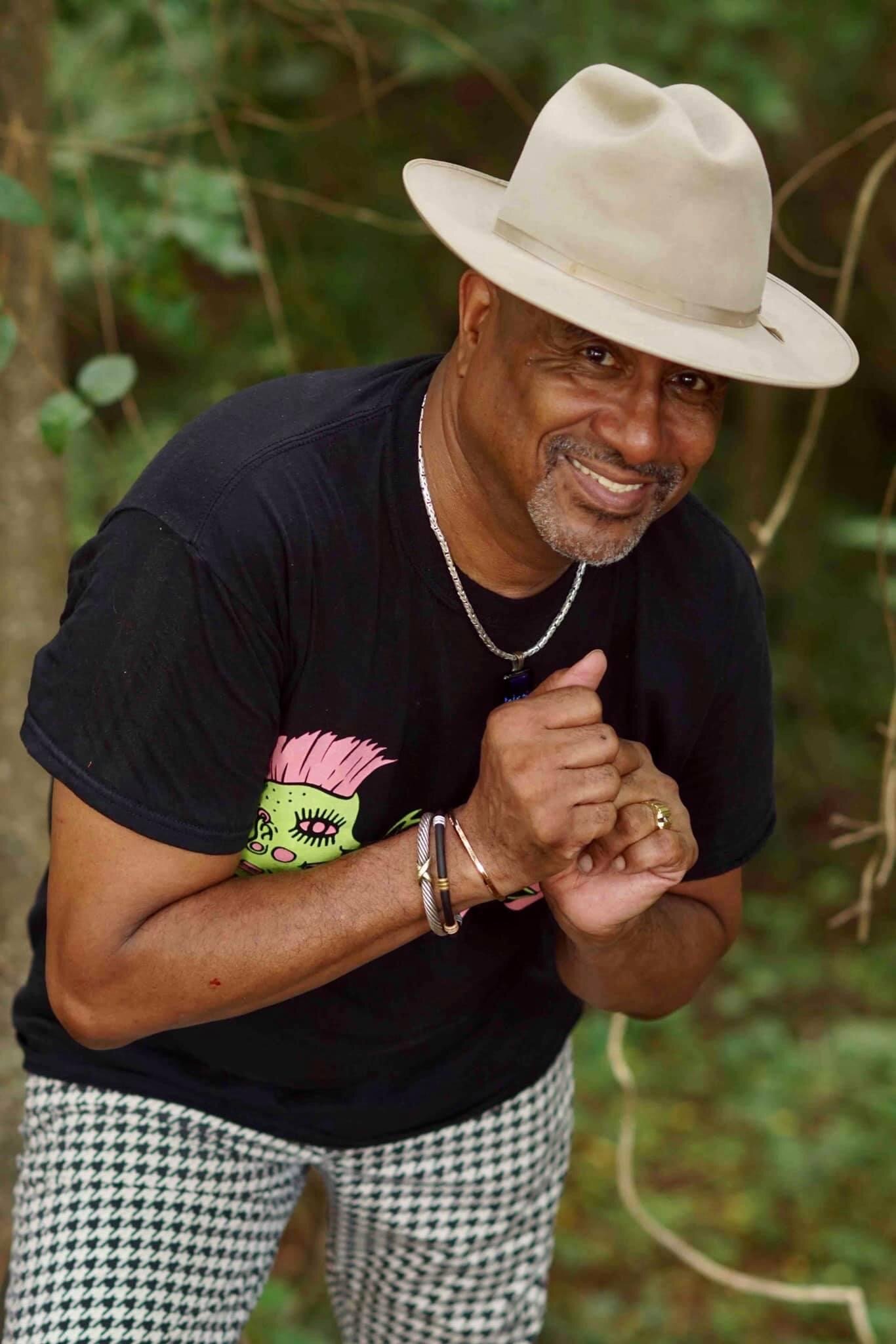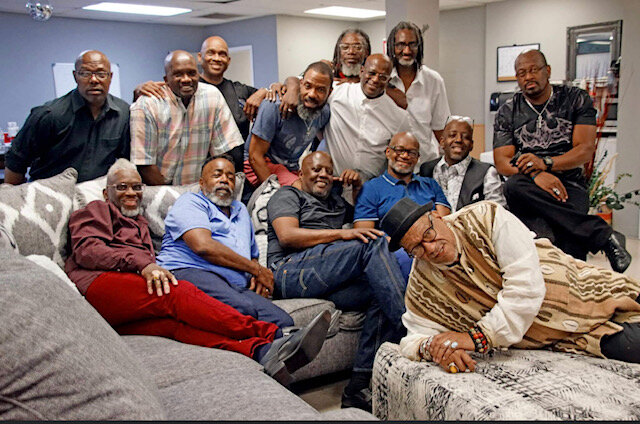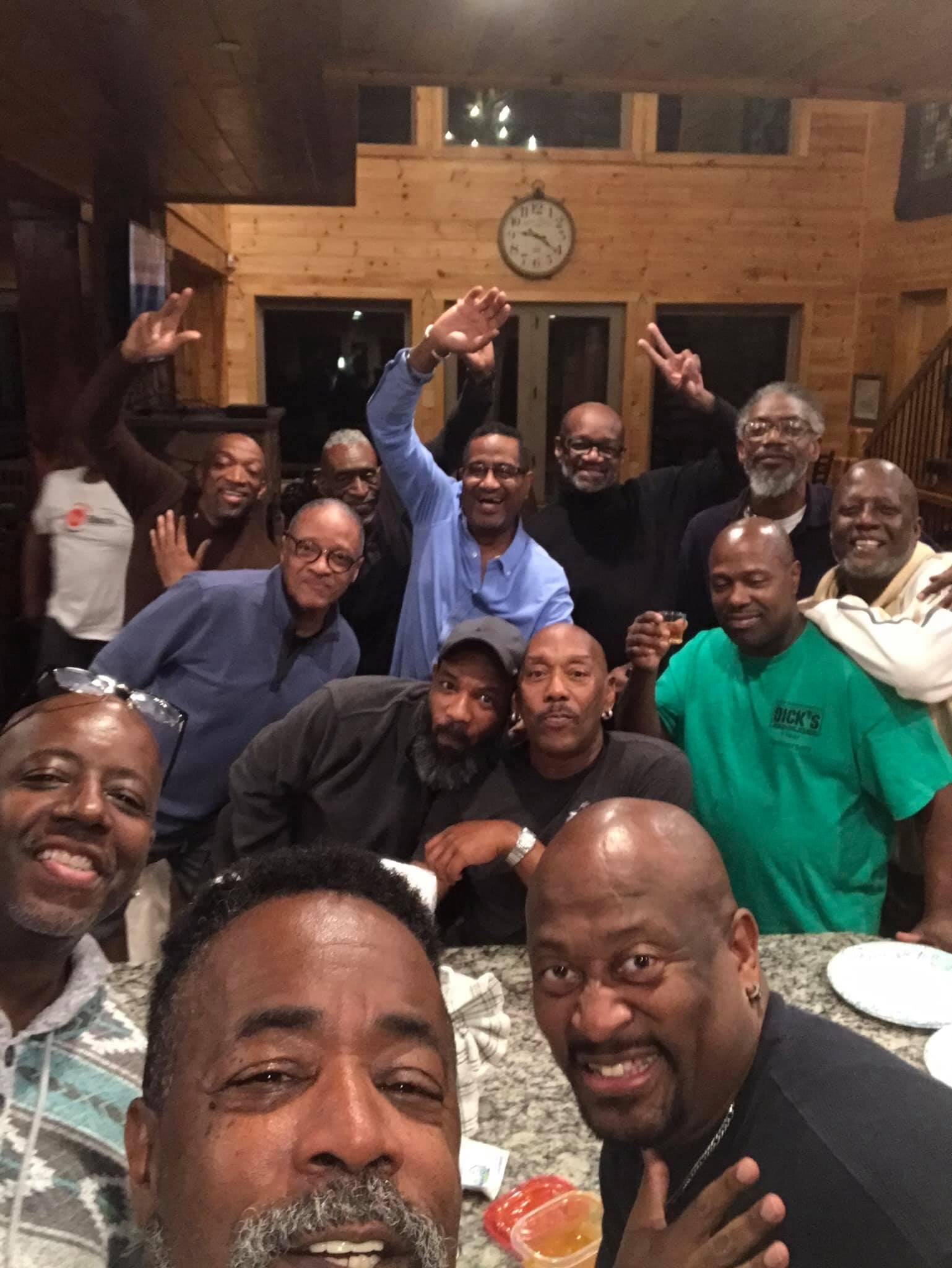Invisible No More: Black Gay Men Over 50 Are Finding The Silver Lining

Some of the men of The Silver Lining Project
In 1989, Malcolm Reid, 63, had gone to so many funerals that he lost count. He remembers being so emotionally exhausted from burying friends he decided during those early days to stop attending funerals altogether. The clock was ticking towards his demise, or so he thought.
“Well, I'm next,” Reid recalls thinking. “And when the next person died, I was like, I'm next. And that never happened. And I remember asking myself, why did they die and I'm still here?”
Darryl “DC” Branch
It would be another eight years, in 1997, before Reid would learn that he acquired HIV. But his story would not mirror those of his friends whom he laid to rest, instead, it would become the impetus he needed to co-create “The Silver Lining Project,” a group that would impact his life and the lives of Black gay men living with HIV, particularly those over 50 who are often rendered invisible in the broader Black gay community.
Reid, the Director of Programs at Thrive SS, an Atlanta-based non-profit organization dedicated to providing support to Black gay/bisexual men living with HIV, recalls the moment he was called to action by Thrive SS Executive Director, Larry Walker, to create a space that reflected his experience as an older Black gay man living with HIV.
“I said, I don't see anything for guys my age. And Larry was like, well, create it. Was he talking to me? I know nothing about this,” said Reid. “And so I walked out of there and I said, okay, I can do this. And I started a group called Mature Men of Color.”
Reid tells The Reckoning that in the beginning stages of what would ultimately become “The Silver Lining Project” through a grant awarded by Gilead in 2018, the men initially connected for a photoshoot arranged by Program Coordinator Darryl “DC” Branch, via Facebook Messenger. It was their first step towards increasing the visibility of Black gay men living with HIV over 50 and ensuring they continued to have a sense of community.
“We are living our counter-narrative because the narrative was that we all had expiration dates, and then suddenly, I realized the good news was that the bad news was wrong.”
And now that there was a space created specifically for them where there wasn’t one before, the Obas, a West African term meaning ruler/kings in the Yoruba and Bini languages, which is what each member of “The Silver Lining Project” is called, flocked to their monthly Obas Roundtable meetings.
“The last meeting in 2019, we had 30 members. We were pulling seats in from everywhere,” said Reid.
And then, in the first half of 2020, the pandemic struck. The in-person meetings were forced to go virtual during quarantine, and the sense of community the Obas created gave way to isolation, loneliness, and fear, and for one member — halted his ability to travel for work, which he would discover was vital to his mental health.
Nathan Townsend
We still have a purpose
For Nathan Townsend, 66, a THRIVE SS board member and public speaker, the temporary disruption of The Silver Lining Project by the pandemic had an impact both personally and professionally.
“I never realized until COVID, how much my public persona fueled my emotional status,” said Townsend. “I was traveling all over the country, and then in March, it just stopped. And then my life stopped. And all of a sudden memories from yesterday started flashing in front of me—how it was in the 80s, where friends just disappeared from the dance floor. If you didn’t see them anymore, you assumed they were gone, and you were usually right. And so all of a sudden COVID brought back all the trauma, all the tearful memories of those we lost,” he said.
Townsend, a Philadelphia native, and former group home manager for people living with HIV learned of his HIV status in 1984 and says he was once a client at the group home he eventually managed.
“I had four T-cells, and I was in the hospital for 40 days,” said Townsend. “I had to get a blood transfusion, and they really thought they were going to lose me. So when I was released, I couldn't go back to my home. I had to go to supportive living, but it was communal living. And I thought, well, if I'm going to die, I'd rather be around people that I knew the whole time I was there as a resident,” he said.
Townsend tells The Reckoning that he was given two years to live, so he began wrapping up his life, but not without reflecting on the parts of it he thought he’d never get to experience.
“I sold my life insurance. I'd never bought a house. I didn't get into a long-term relationship because I wasn't going to be here,” he said.
According to Reid, who echoed Townsend’s experience, the sale of life insurance policies in the late 80s and early 90s for people living with HIV was common.
“I remember they had a big program—if you're living with HIV, well, if you’ve got AIDS you can sell your life insurance policy. And many people did,” said Reid. “You couldn't work, not because you were physically unable to work, but because nobody wanted to be near you. And once you found out that you had AIDS, you couldn't go to work. So a lot of people either ended up being homeless and struggling or were able to collect disability. And that was very random,” he said.
At 64, Townsend said he faced a choice: “Am I just going to sit here and get older and die? Or am I going to go somewhere and start a new beginning?”
He chose a new beginning, and that included moving to Atlanta and finding brotherhood in “The Silver Lining Project.”
“I found a base, a brotherhood that looked just like me,” said Townsend. “Many times, people look at seniors and think that they're at the end or that they're just living from memory to memory. We’re still creating. We still have purpose. We still have meaning. We still have value. And to be in a place where I never thought I would be, I'm actually living just like you, because every day is a new beginning.”
Some of the men of The Silver Lining Project
Am I my brother’s keeper?
A source of wisdom and spiritual reverence inside The Silver Lining Project, Rev. Elder Claude Bowen, 73, is no stranger to new beginnings. A Memphis, TN, native, raised in Los Angeles, he moved to Atlanta in 2006, officially closing the chapter on a previous life that included a wife of three-years and several unsuccessful attempts at practicing heterosexuality.
“I was practicing something that I would never perfect because it was not me,” said Bowen. “And I was honest with her—I cannot stay in this house, say I love you, which I did, but pretend to be in love with you, be intimate with you, when I'm really thinking about somebody of the same gender of another name,” he said.
Bowen, a former Vietnam veteran, and postal worker, has been living with HIV for 34 years. He tells The Reckoning that he was slow to acknowledge his new health status after acquiring HIV in the late 80s.
Rev. Elder Claude Bowen
“I didn't take ownership of being positive until my dearest friend transitioned while I was on vacation. And when I came back, I discovered he had died from complications of AIDS,” said Bowen. “He had not told me, so that was a guilt trip I went through. Then there was anger. Why didn't he tell me? Why didn't he feel comfortable enough to tell me? We had been to parks, bathhouses, all kinds of things together. And you couldn't tell me you were sick? And I vowed then that I would not live that lie. And I also would not allow anyone to go through that process alone if I could help it,” he said.
Loneliness is a topic that often comes up for Black gay men of any age but is often intensified for men over 50.
“I have a group of friends that I've aged with,” said Darryl “DC” Branch. “They live in Detroit, but we talk almost every day along with my group of friends here—Claude, Joe [Robinson, “The Silver Lining Project,” Program Coordinator] the guys from Thrive. I'm lucky in the aspect that I have those people around me. My roommate is older than me, but he’s someone I can also talk to. He didn't like the idea of living by himself. He didn't want to be lonely. But I know some guys who say they're lonely,” he said.
Bowen points out that there is a difference between being alone and being lonely, which “The Silver Lining Project” doesn’t hesitate to address among the Obas.
“We talk about it because we want those that really feel lonely to feel attached to something. To feel attached to a brotherhood that won't let them be out there by themselves. And as we talk about that brotherhood and supporting and loving each other, we make each other comfortable enough to talk about the intimate loneliness that we go through but seldom talk about,” said Bowen.
Bridging the gap between the Obas and younger Black gay men is a key initiative for “The Silver Lining Project’s” immediate future, especially in the face of ageism and rising HIV diagnoses in Metro Atlanta. Reid’s advice to young Black gay men who may write off men in his age group is “to keep on living.”
“We talk about it because we want those that really feel lonely to feel attached to something. To feel attached to a brotherhood that won’t let them be out there by themselves. ”
"Especially the ones that are living with HIV, I'm saying, understand this—HIV is not a death sentence. And what that means is you will probably live to be my age or older,” he said.
“We are living our counter-narrative because the narrative was that we all had expiration dates,” said Townsend. “And then suddenly, I realized the good news was that the bad news was wrong.”






